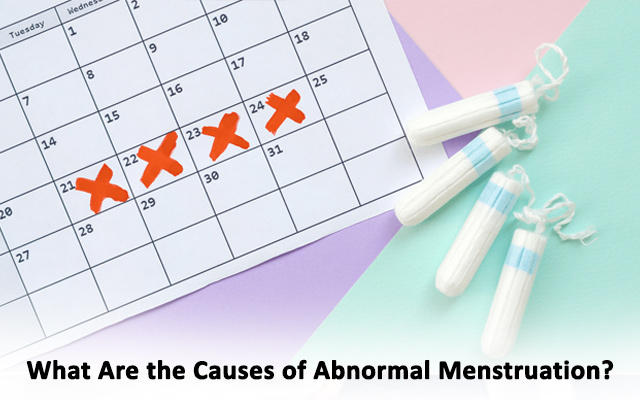In a healthy woman, a menstrual cycle generally lasts between 21 to 35 days. However, for some women, irregular or abnormal periods can disrupt this cycle, leading to missed periods or other health concerns. Understanding the symptoms and causes of abnormal menstruation is important for identifying any underlying health issues and seeking appropriate treatment.
Symptoms of Abnormal Menstruation
Some common signs of abnormal periods are:
- Periods occurring fewer than 21 days or more than 35 days apart: If your periods are happening too frequently or infrequently, it may indicate an underlying issue.
- Missed three or more periods: Skipping multiple periods in a row can be a sign of hormonal imbalances or other health conditions.
- Too heavy or too light bleeding: An abnormally heavy flow, where you are changing pads or tampons frequently, or an unusually light flow can both be indicators of abnormal menstruation.
- Periods lasting longer than 7 days: A menstrual period that lasts more than a week is considered abnormal.
- Severe cramps: While mild cramps are normal during menstruation, severe pain that hampers your daily activities may suggest an underlying problem.
- Using more than one or two pads in one or two hours: If you need to change pads or tampons this frequently, you may be experiencing excessively heavy bleeding, which could indicate a problem like fibroids or a bleeding disorder.
Causes of Abnormal Menstruation
There are several possible causes of abnormal menstruation. These can range from hormonal imbalances to more serious medical conditions. Here are some common causes:
Pelvic Inflammatory Disease (PID)
PID is an infection of the female reproductive tract, often caused by sexually transmitted bacteria. It leads to irregular periods, along with symptoms like pelvic pain and unusual discharge. If left untreated, PID can cause long-term complications like infertility.
Endometriosis
In women with endometriosis, tissue that lines the inside of the uterus wall starts growing outside of it. This condition causes painful periods, heavy bleeding, and irregular menstrual cycles. Endometriosis is a common cause of menstrual abnormalities and requires medical attention for proper management.
Polycystic Ovary Syndrome (PCOS)
PCOS is a hormonal disorder that affects how the ovaries function. It can cause irregular or absent periods, as well as other symptoms like weight gain, acne, and excessive hair growth. Women with PCOS may also experience difficulty conceiving due to anovulation.
Uterine Fibroids or polyps
Growth of polyps can cause heavy bleeding or intermenstrual bleeding. This can also cause dull aching in the abdomen or lower back.
Uterine Cancer or Ovarian Cancer
In rare cases, abnormal menstruation can be a sign of uterine or ovarian cancer. Women who experience unusual bleeding, particularly after menopause or those who are obese, diabetic, hypertensive with history of chronic anovulation, should seek medical attention to rule out these serious conditions.
Conclusion
Abnormal menstruation can be concerning, but understanding the symptoms and causes of abnormal menstruation is the first step toward addressing any underlying issues. With proper diagnosis and treatment, you will be able to manage menstrual health problems.
Consult the best gynae doctor in Salt Lake to have a deeper understanding and cause and treatment options of abnormal menstruation.


